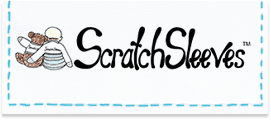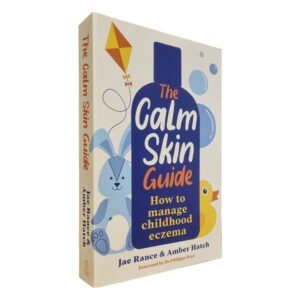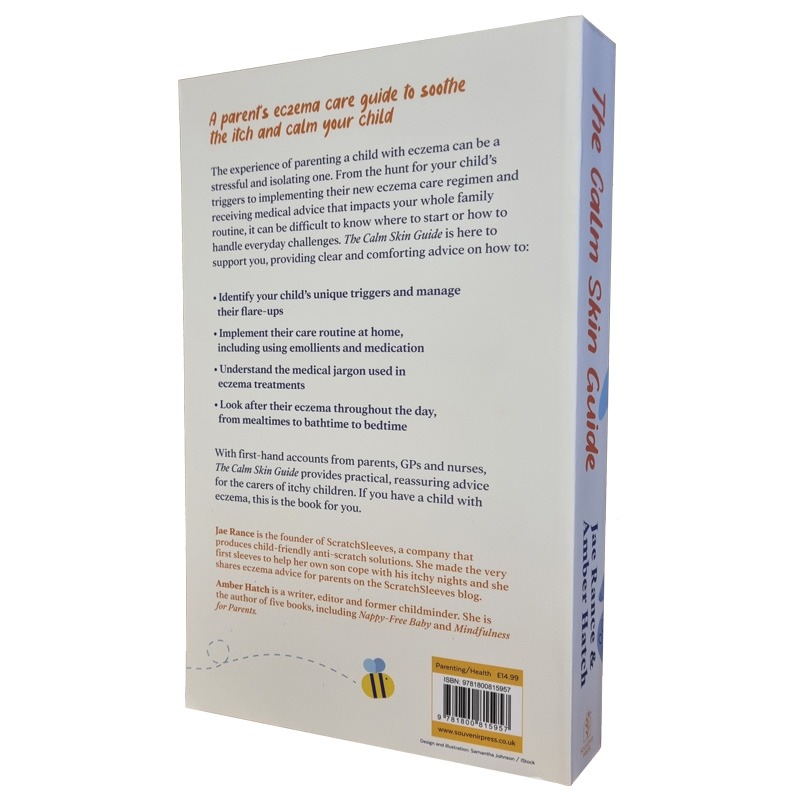Baby eczema and anaphylaxis

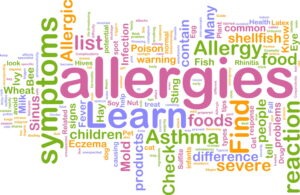

Babies and children with eczema are more likely to suffer from dangerous allergic reactions. We asked Dr Nikky Ellis – A&E doctor, paediatric first-aid teacher and eczema/allergy mum – to tell us how to recognise the signs of a serious allergic reaction and what to do. Dr Nikky has first-hand experience of dealing with her own son’s anaphylactic reaction and even with all her medical experience, she wished that she had been better prepared.
Eczema and anaphylaxis
Young children with a history of eczema, especially those with multiple food or egg allergies are at a higher risk of anaphylactic reactions. Like most medical conditions, allergy has a spectrum of severity with anaphylaxis being at the extreme (and thankfully rare) end. But with the incidence of allergy continuing to increase worldwide, more and more episodes of life-threatening anaphylaxis are occurring. The NHS estimates that there are 20-30 deaths from anaphylaxis each year in the UK.
What is anaphylaxis?
Anaphylaxis (or anaphylactic shock) is a life-threatening allergic syndrome that can occur just minutes after exposure to the allergic trigger. It can occur at any age and usually requires previous contact to the trigger or allergen, but can occasionally happen on first exposure. Allergens that have an increased likelihood of causing anaphylaxis include nuts, shellfish, egg, insect stings, latex and medicines. The list is long and even includes exercise and extremes of temperature, however, the majority of anaphylactic reactions (over 50%) are triggered by food.
Although it is fairly rare, it is crucial that parents know how to recognise the signs and symptoms and are able to act immediately. This is especially true parents of children who have allergies or who are at risk of having allergies eg. those that have eczema. Allergies, eczema and anaphylaxis commonly occur together.
This image prints out on handy postcard size, great for keeping in the changing bag or giving to your child’s other carers: grandparents, baby sitters, child-minders, etc so that they also know what to look out for. Our free Changing Bag Guide includes a reminder of what to do and the recovery positions for babies and children.
Key signs of anaphylaxis
The signs and symptoms of anaphylaxis are mainly as a result of blood vessels become leaky and dilated, and smooth muscle contracting and include:
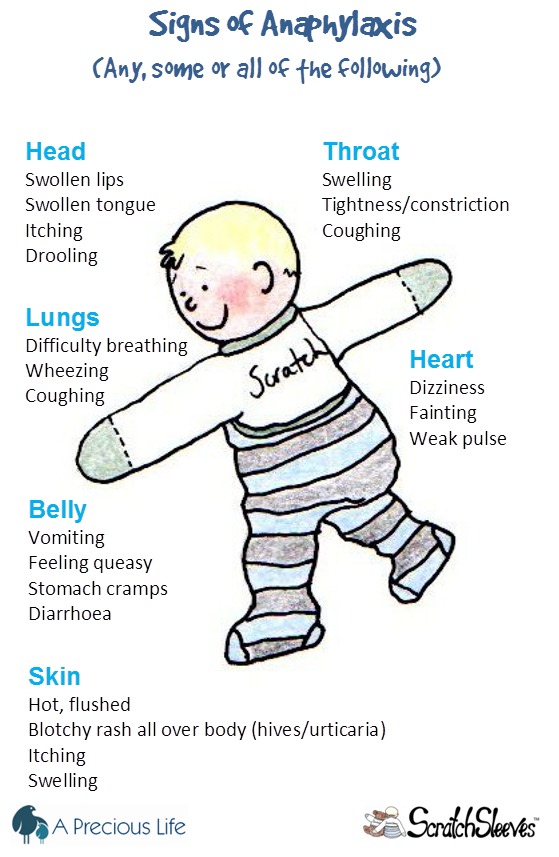
- Difficulty breathing/audible wheeze
- Swelling of the lips, throat, face and tongue
- Sudden and excessive drooling
- Faintness and dizziness caused by a significant drop in blood pressure
- Warm, flushed feeling
- Blotchy rash all over the body (also known as hives or urticaria)
- Hoarse voice
- Nausea and vomiting
- Stomach cramps
- Diarrhoea
- Unconsciousness
Anaphylaxis: What to do
- Call 999 straight away if your child is struggling to breathe, seems lethargic or you are concerned
- Keep calm: both yourself and your child.
- Use an EpiPen: If your child has had a previous anaphylactic attack then your GP may have prescribed an EpiPen® or other adrenaline autoinjectors. The injectable adrenaline must be carried at all times and inserted into the thigh when an attack occurs. The key things with adrenaline are that the sooner that it is given then the more effective it is; if you are unsure whether to give it, just give it – it won’t do your child any harm but it may save their life; make sure you and anyone caring for your child, are confident in how to use it.
- Give antihistamine: If you have antihistamine available (e.g. children’s Piriton) and the child is conscious and able to swallow, give the appropriate dose (always read the label)
- If the trigger was food then don’t make your child vomit as this will only worsen the situation.
- If the attack was caused by a bee sting then remove the sting if possible (but with minimal manipulation).
- Recovery position: If your child becomes unconscious then you need to establish if they are still breathing. If they then place them in the recovery position, before calling 999. If they are not breathing, call 999 immediately for instructions on Basic Life Support.
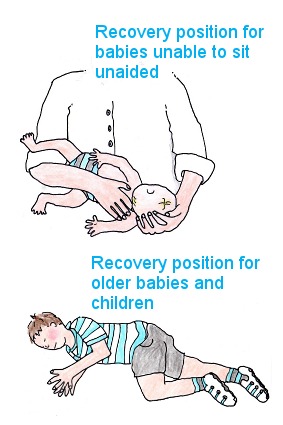
Being able to perform Basic Life Support as a parent is a vital skill. Acting immediately can drastically affect the outcome of events and that requires confidence as well as knowledge.
Preventing future anaphylactic shocks in eczema children
-
Be vigilant about ingredients
Read labels carefully and ask at restaurants whether a meal contains the trigger ingredient. Be especially aware of food preservatives and colourings. -
Keep shoes on
Don’t let your child toddle barefoot outside as they could step on an insect and this could trigger a reaction. -
Always carry at least two adrenaline auto-injector pens
Make sure you keep the adrenaline cool as it won’t work in high temperatures. Make sure anyone who looks after your child has an adrenaline auto-injector and is confident in when and how to use it. Some companies offer free training devices so that you can practice at home. -
Act quickly…
..even if you are unsure the reaction is anaphylaxis. Treating your child immediately could save his or her life. A delay in treatment could have catastrophic consequences. Giving the adrenaline dose will not cause your child any harm if the reaction wasn’t a full-blown anaphylactic attack -
Follow up
Always call your doctor for a follow-up appointment after an attack. -
Ongoing support
Any child that has suffered from an anaphylactic episode should be under an Allergy Specialist (CG134 Anaphylaxis: NICE guideline). If this hasn’t been offered to your child, get in touch with your GP to arrange.
Whilst anaphylaxis, and indeed ever needing to administer Basic Life Support to a baby or child is extremely rare, these are situations when parents and carers need the confidence to act immediately. As a doctor that specialises in Emergency Medicine and as a mum of two young boys, one of whom developed a severe allergic reaction to egg at just 9 months old, I am passionate that more parents are trained in a practical approach to Emergency Situations. For further details visit Dr Nikky Ellis’ website at www.apreciouslife.co.uk.
Other recommended resources:
- Allergy UK – UK charity established to represent people with allergy, food intolerance and chemical sensitivity. Their website has loads of useful information and links
- Anaphylaxis Campaign – UK charity for people at risk from severe allergic reactions and anaphylaxis operating both helpline and support groups as well as having great information available on their website
- NICE guidelines – the treatment and support you can expect from the NHS if your child has had an anaphylactic episode
Our Editorial Policy
Here at ScratchSleeves, we aim to bring you trustworthy and accurate information. We collaborate with qualified dermatologists and doctors as well as drawing on peer-reviewed medical studies and our own experience as parents. All medical content is reviewed by a dermatologist or appropriate doctor prior to publication to ensure completeness, accuracy and appropriate use of medical language. Reviewer details can be found at the bottom of each reviewed post and also on our ‘Meet The Team’ page.
All scientific research referred to in our blog is found in peer-reviewed publications. All eczema related medical articles we refer to are included in the GREAT database (Global Resource of Eczema Trials) managed by the Centre of Evidence Based Dermatology at the University of Nottingham. This database brings together information on all randomised control trials and systematic reviews of eczema treatments. Trials are identified using a highly sensitive, comprehensive search strategy that is compatible with standard Cochrane methodology. Cochrane is internationally recognised as the highest standard in evidence-based health care. Links to the publications we refer to are listed at the bottom of each article.
Disclaimer
The original editorial information we provide is not intended to be a substitute for professional medical advice, diagnosis, or treatment. Always seek the advice of your doctor or other qualified healthcare practitioners regarding a medical condition. Never disregard professional medical advice or delay in seeking it in because of anything you have read on the ScratchSleeves blog.
Here at ScratchSleeves, we don’t just share our experiences of bringing up an eczema child (and favourite allergy friendly recipes), we also manufacture and sell our unique stay-on scratch mitts and PJs for itchy babies, toddlers and children. We now stock sizes from 0-adult in a range of colours. Visit our webshop for more information.
The Calm Skin Guide
Love our blog? It's also available in book format with:
- First hand accounts from parents & medical professionals
- Easy navigation
- Comprehensive index
- Additional material
Signed copies available at no extra cost
Written by:
Reviewed by:
Interesting article? Don't keep it to yourself...
Read next...
You may also find helpful...
Quick buy


Multi Buy Discount

Spend between £30 - £60 and save 5%
Spend between £60 - £120 and save 10%
Spend over £120 and save 15%
Discount automatically applied at checkout
No Quibbles Guarantee
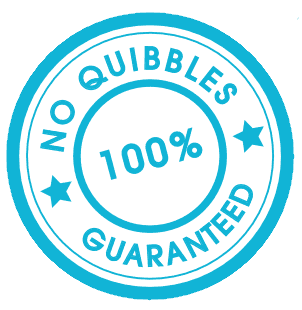
ScratchSleeves abide by a no quibbles guarantee.
Free UK Postage

Free packing and postage on all UK orders. For overseas orders to Europe postage is from £3.50, to USA is £6.50 and to the rest of the world, from £3.75.

